- Words Chantal Sackey
- Photographer Shalev Ariel
- Direction & Set Design Toar Avni
- Hair Shay Halaly Ziv
- Makeup Rosa Shwartsman
- Styling Chumi Polak
- Assistance Yuval Asis, Meidan Gil, Yonatan Harel
- Talent Agency City Slang
Tel-Aviv-based singer, rapper, and producer Noga Erez draws on the personal experiences that have shaped her to captivate through her powerful and distinctive voice.
In her debut album “ Off the Radar” released in 2017 with strong lyrics about state surveillance and assaults, she does not shy away from taking up difficult topics and was highly acclaimed. The song “Dance While You Shoot” was used in Apple music commercials worldwide. With her second album ‘KIDS’ released on 26th March 2021, Noga is more personal and touches on deep feelings such as toxic relationships, mortality, loss, and insecurities. Her brilliant videos complement her euphoric, poetic songs. Even original snippets from her mother are used.
In her interview with Notion, Noga Erez talks about her latest EP ‘KIDS’, her journey as an artist, and how she became the person she is today.

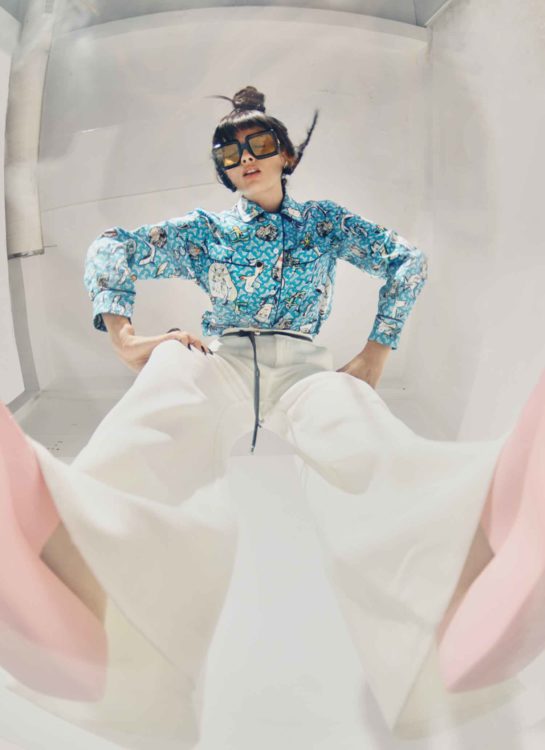
You grew up in Caesarea, in the north of Israel. What significant moment did you experience in your childhood?
The most significant moment I can remember is when my mother took me to kindergarten. It was raining and where I come from in a small town in the north of Israel the parents would drive their children to kindergarten and I would sit in the front seat of the car, which of course is illegal. I put my feet on the shelf and because it was raining the windscreen wipers moved from right to left and I moved them to the windscreen wipers. A Beatles song started playing and the tempo of my feet and the wipers and everything was in sync with the music. I remember that was the first time I felt like I was in a music video.
When did you realize you wanted to pursue a career in the music industry?
I think it was around the age of 18, when I moved to Tel Aviv. I started to meet with other musicians and realized that it’s something that you could possibly pursue as a career.

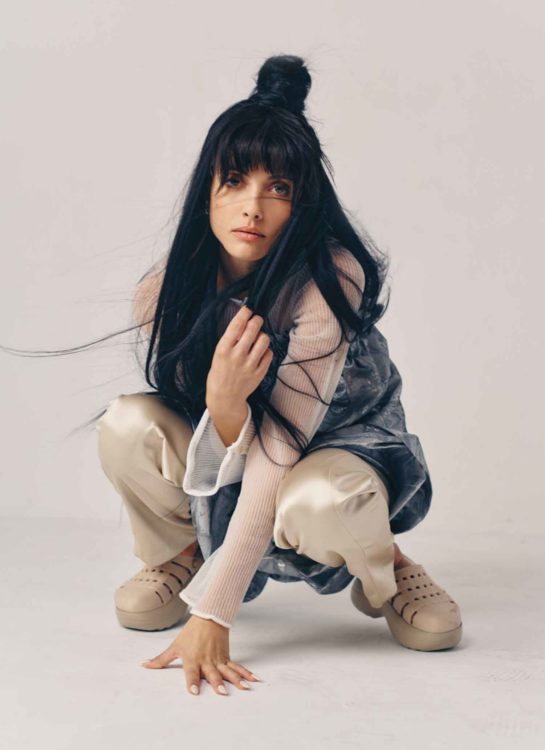
You’ve had your breakthrough and achieved a lot. “Dance While You Shoot” from your Debut Off the Radar was featured in Apple’s music ad in 2016 and you performed “ VIEWS” ago on Jimmy Kimmel. What does it mean to you and how do you define success?
Sure, playing a show in front of thousands of people, performing on TV, or landing a big sync can give you the feeling of success. But for me, the true feeling of success, which I can really grasp, is a good day in the studio, because it’s not an easy place for me. It’s a place of confronting myself and my fear of failing and all those things. When I feel good there, I feel very good about myself. That is how I equate success.
You write and produce together with your partner Ori. What does your concrete collaboration look like?
What does your songwriting process look like? Do you have a melody in your head and then you write?
It really changes from one song to the other. We really try to keep the process fresh and shake it up. Our comfort zone is to start with the beats that are usually made by Ori. Then we start improvising and babbling words over it and sometimes through that you get a few words that are more catchier. Then we kind of build everything around that. That’s how it usually works for us, but we also have many other different techniques and we try to change them as often as possible.
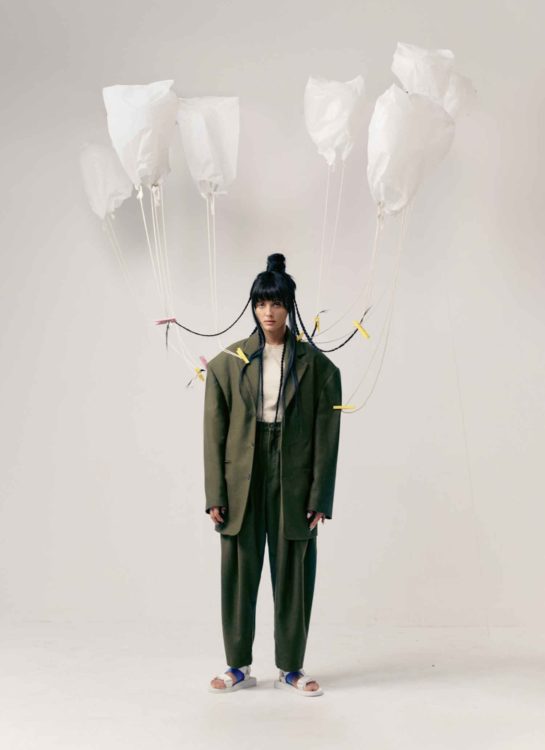

You are a creative couple that complements each other well. Are there also difficulties in teamwork?
Certainly it can’t always be perfect. I am very grateful to have a partner who gives me a lot of freedom, room to create, trusts me to be myself and helps me develop as a creative person. I try to be the same for him. Our secret as I see it is mutual giving. I try to give him everything he needs and everything he doesn’t even know he needs. When you have so much giving going back and forth, I feel that’s kinda like an ecosystem that can exist and feed itself. Of course, we spend 24 /7 together and I sometimes get angry, moody or stressed, which is human. We’re really good at doing this together. We really love each other.
Why did you choose the title ‘KIDS’?
We could have called the album people, because it talks about so many different things, but ultimately it comes from a human perspective. Even when we talk about social issues or things that are considered political, it’s always about the people within those situations. When you talk about people, you’re usually talking about adults. I wanted to bring empathy into my view of the world, because for a while I was very angry at the injustices in the world. I needed a perspective that was more empathetic. The fact that I’m an artist and people listen to my music, I needed to offer something comforting. We were all children a second ago. I feel like I was a child a second ago. Every one of us still has that childlike in us. At the end of the day, we are all grown-up children and need a hug.
All over the album we hear samples from your mother. How did you come to this unusual idea? She seems to be very close to you and plays an important role in your life.
We take our mothers for granted, that’s what I feel. I was able to learn this through the experience, when Ori, my life partner, lost his mother 4 years ago. I knew her very well. We were very close and I was able to experience someone losing their mother. That gave me the opportunity to really appreciate the fact, that my mother is here. She is so great and has been an active influence in my life. I just wanted her to be included and be in my music. She also represents the voice of the older generation, that sometimes comes in and says funny and strange things that have nothing to do with reality as it is in the modern world.

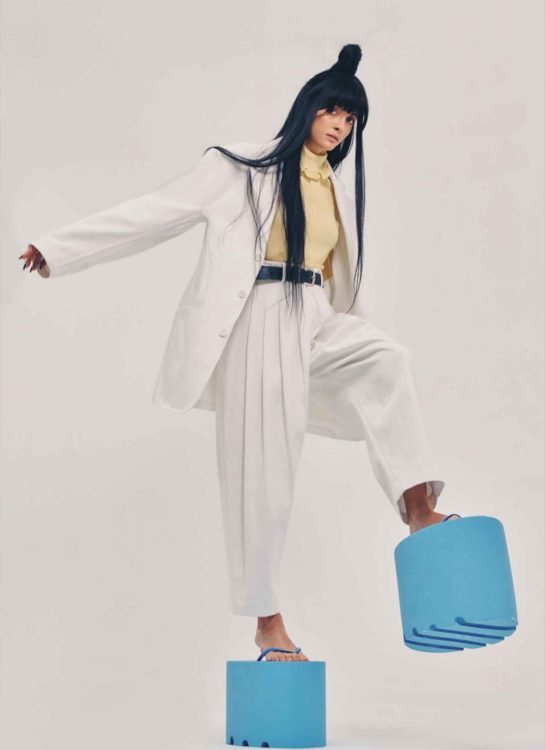
You were in a toxic relationship. How was your darkest time in your life?
It was dark and I didn’t even realize it. I came to a place where I was not aware of it. It’s really scary, because when you’ve had the experience of being out of touch with yourself, you know that’s the scariest thing in the world. You are so deeply disconnected from your own emotional world and feelings, that you can literally experience something in a way that is different from what it is. What happened to me is that I lost myself in the relationship and didn’t realize I was in an emotionally abusive relationship until years after it ended. When it’s emotionally abusive, it’s so hard. The scars are there. They are real and affect my life to this day. My relationship is affected by it, but you can’t see the scar, because it is an emotional one. For me it was important to say, here I am, it happened to me. It happened to so many people. The most important thing I do is to be open with my vulnerability. I want to live in a world that accepts weakness and vulnerability. That would be good for all of us. To live in a place that embraces weakness in a more loving way.
How did you manage to give up this relationship?
It reached the peak of being completely destructive, like getting me to a point where I was drained with energy, that I was not able to really realize what I wanted to do with my life. It took almost 2 years of my friends and my mother having hours of conversations with me, trying to talk me out of staying there. They didn’t give up on me, but it took a very long time. After it was over, it still took years to get out of that mechanism. That mechanism of thinking this is what I deserve or this is how it should be or the thing, when a man doesn’t really love or respect me. It took me time to realize that if a man loves you, cares for you and is kind-hearted – that’s it.
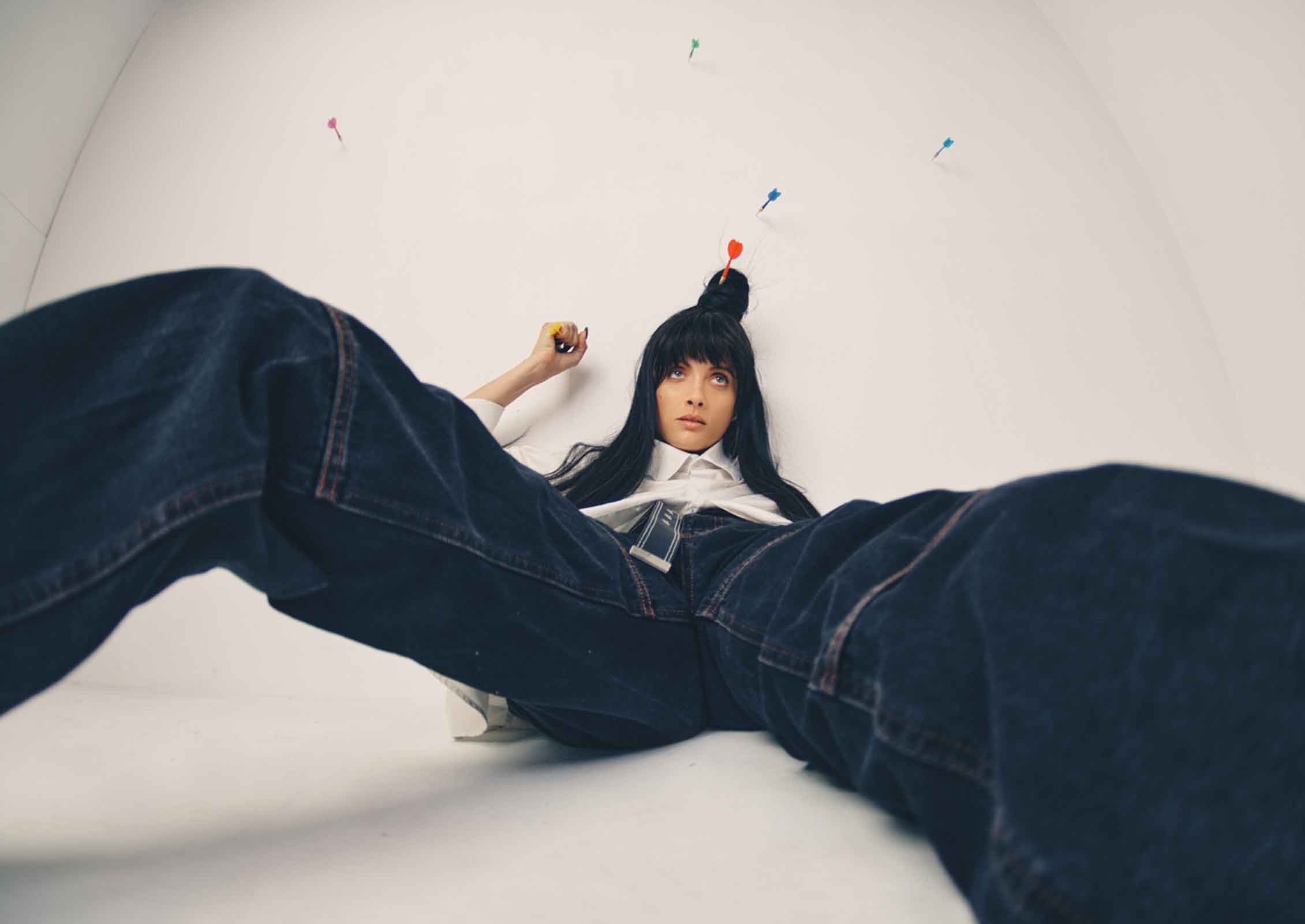
You love openness, authenticity and provocation. How did you become this independent personality?
I think without doing anything, it was my parents. They were both for different reasons just very good at letting me be whatever I wanted to be, whenever I wanted to be that. That wasn’t always easy. It’s easier to be a parent who sets boundaries and decides for the children. It makes things easier because everything is clearer when the child is young and it’s easy to kind of design what you want them to be. I was lucky enough to grow up in a home, where it was always, if you want something, do it. They never blamed me for not liking school or not doing my homework. My parents always said: “Yes, play the piano or we understand it, go out.” I’m very lucky and that’s rare.
I think the video that you created with director Indy Hait is very interesting. The visuals show how a robot control rig is throwing you around. What’s the key for your creative direction ?
It was my third collaboration with Indy. The first two we did together, I was very strict with my concept. I had to trust him and he just did a great job. With the other ones I was like: ‘how do you imagine this?’ He was like ‘a robot’ and I was like ‘there’s no way that would look good. I don’t like robots and I’m not into all that cyber shit.’ Indy talked me into it. Just by working with him and seeing what a genius he is. The creative process usually starts between Ori and I on the sofa at night. We try to imagine what we want the song to look like visually and then meet with the director to see where he would take it. It’s a process that everyone is involved in.
Your music is inspired by Kendrick Lamar, Tyler, the Creator and Nancy Sinatra. What qualities do you admire in them?
With Kendrick it’s obviously about the flows, the rhymes and the way he writes his lyrics. Tyler, the Creator is what inspires me to be humorous and light hearted with my music, but also a lot of inspiration that comes from working with synthesizers, visually as well. Nancy Sinatra is my oldest hero. There’s something about her spirit. I like the kind of femininity she represents.
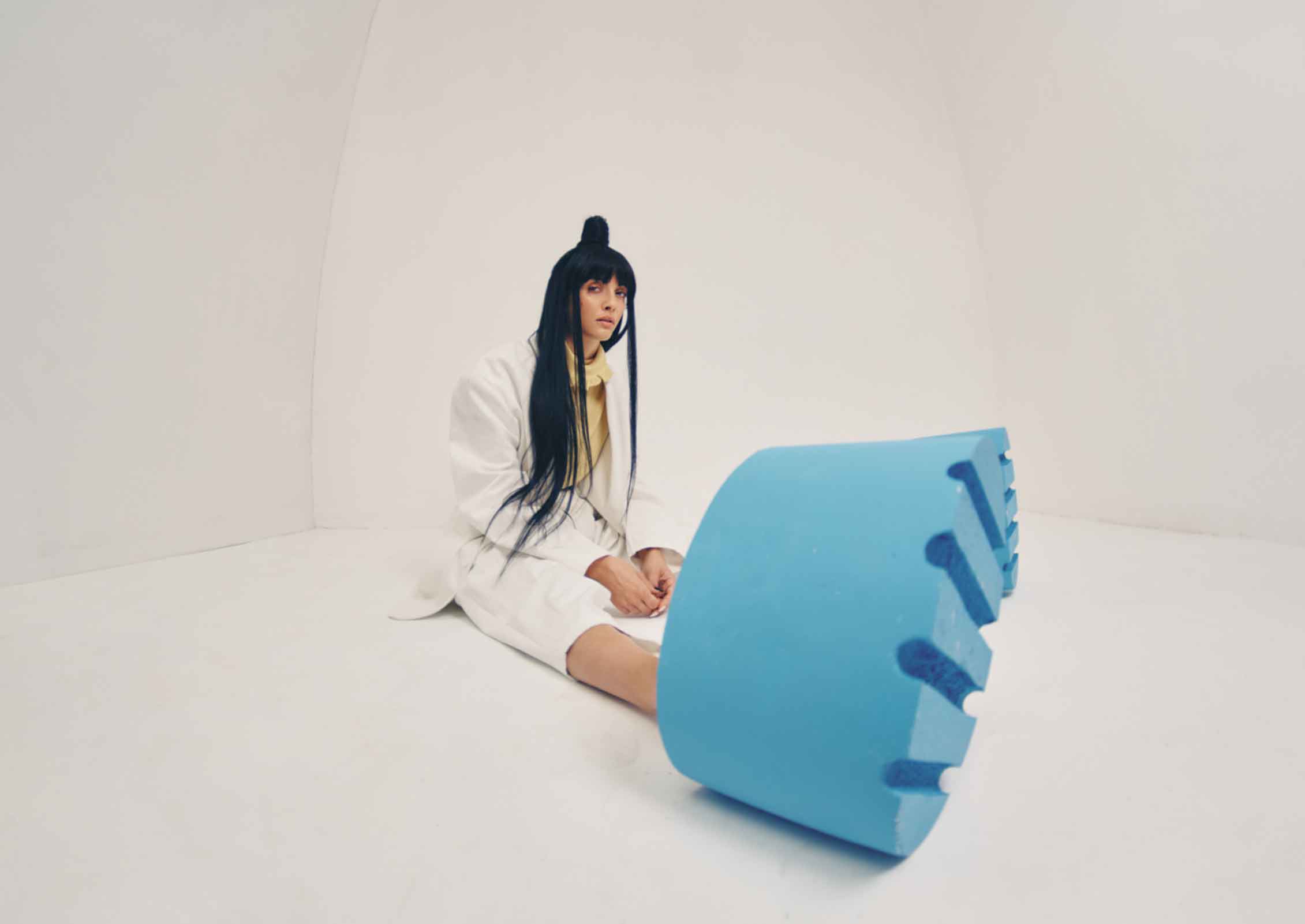
What moves you when we talk about self-development and the struggle to grow up?
Struggling with one’s own self-confidence is something I work on. Having self-confidence is getting harder and harder these days. Not looking at yourself and thinking that someone else must be doing it better than you, because of social media. I’m fine, but I’m a bit worried about the people who didn’t have time to grow up without social media. I just really hope that the kids are able to see that you don’t have to try to be someone else or try to relate to something you have nothing to do with. I think that’s a difficult place to be and causes a lot of suffering. It really touches me and makes me think about how we should deal with this new world we live in, that is going in so many different directions.
What’s next for you? What footprint do you want to leave?
A lot of touring. I’m planning to start working on the next project. I hope that I can bring a tiny bit of good to the world, help people to feel, get closer to themselves in a very intimate way. I also want to give moments of connection and escapism.

